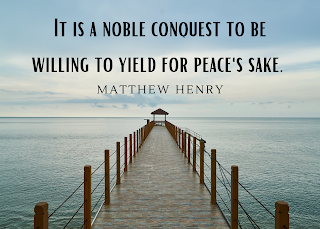What Will You Yield For The Sake Of Peace?
Relationships are hard. That's what it comes down to. If you have two people in any kind of relationship, partnership, family, or friendship, it will never be sunshine and rainbows all day, every day. That's just unrealistic.
Instead, what we see every day is the give-and-take necessary to preserve peace. It's so simple to reject, raise our voices, let words be our weapons, turn our backs, and stir things up to get our own way. That's what our flesh and our emotions tell us to do - whatever it takes to protect ourselves. Sound familiar? Feel familiar?
But that's not what the Spirit whispers to us. No, His response is love and humility. What a stark contrast to the flesh and its red-hot desires.
Abraham is an amazing, realistic picture of how to handle the aggravations in our everyday relationships. He and Lot were kin, uncle and nephew, but that blood relation didn't stop the strife. (Oh, don't we know it!) When the herdsmen from their two estates quarreled about grazing rights, they were quick to bring Abraham and Lot into the fight. Isn't that what usually happens? You're just living your life and someone brings you into their drama?
As the elder member of the family and the head of the household, Abraham had a choice to make: he could kick Lot off the property, drive the cattle away, and let those herdsmen know that they weren't welcome here anymore. Stand up. Fight. Take what's yours. That was within his rights.
But rights don't mean much when a relationship has the potential to be shattered. My land vs. your land isn't worth destroying something that took years - perhaps decades - to build. It might feel good and right at the time, but the consequences are huge.
Commentary writer Matthew Henry once said, It is a noble conquest to be willing to yield for peace's sake. He saw in Abraham a man who was willing to do whatever it took to protect his family, their bond, and their future together. He saw a man who would give up his rights to whatever he was owed because the love of his family was more important. Peace was more important. Preservation was more important.
Notice these things as you read Abraham's story in Genesis 13:
* There's no doubt that the neighbors, the people of the land around them, saw and heard the arguments and judged God's people for how they treated each other.
* If differences do happen - and they will - fix them and heal them as quickly as possible.
* Don't let position, title, rank, or age get in the way of humility.
* Stirring the pot only results in a swirling mess.
* Remember that a soft answer turns away wrath (Proverbs 15:1)
* Love and peace come before all else.
As you begin this new week, have a conversation with God about any relationships you have that need some humility. We can't control other people's words and actions, but we do have complete control over our own reactions. When we step into each relationship today, my prayer is that we'll listen to the Spirit telling us to protect and preserve peace at all costs. This is how we build up and encourage each other and share the love of God in real, tangible ways.




Comments
Post a Comment